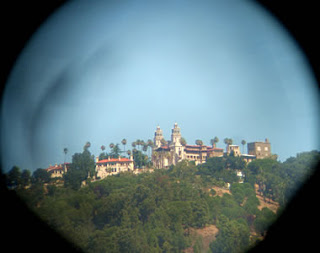Have you ever looked through one of those telescopes? Where
the only thing you can see is dictated by what the small circle of viewable
space on the other side of the telescope. This is similar to agenda setting.
Whilst you are still viewing the reality, it is only through the telescope that
you see it. Media is much like the telescope. You still view reality, but as
determined by what media allows us to see. It focuses only on particular things. Media is the same, it manipulates and determines the reality we see.
We watch news to find out about whats happening in the world because we aren’t
personally there to first-hand witness the events… so where do we get all our
knowledge about the world? Through the media. This leaves a lot of power up to
the media to determine what is important and how we view those events. Media
interprets reality because it determines what stories and events are important
enough for us to view, if the stories aren’t viewable, then we will not hear or
think about them, and thus they are deemed unimportant. As corroborated by the
quote:
“Agenda setting is the process of the mass media presenting
certain issues frequently and prominently with the result that large segments
of the public come to perceive those issues as more important than others.
Simply put, the more coverage an issue receives, the more important it is to
us.”
(Coleman, McCombs,
Shaw, Weaver, 2008)
The media largely
influences our views, reactions and thoughts on events and issues. It may not
tell us what to think about an issue, but rather it tells us the issues that
need to be thought about. Whether it be the attitude we gain from the
perspective given to us through the particular news story, or the images
presented to us, or even the fact that it has made top news has lead us to
believe that it is important and is worth our thoughts and opinions.
If it is only every news channel, on the front page of the
newspaper, if it is all over the radio, then it is made clear to us that that
particular story is important, and needs to be thought about. Whereas if a
story is on page 50 of the newspaper, along with a bunch of other news stories,
it is clear that the agenda for this story is not as important as the one for
the front page. We are told about the issues and events that are deemed
important by the media. This is the agenda set by the media production of
topics.
There are four types of agenda:
1)
Public Agenda- the set of topics that members of
the public perceive as important.
2)
Policy Agenda- issues that decision makers think
are salient
3)
Corporate Agenda- issues that big business and
corporations consider important
4)
Media Agenda- issues discussed in the
media
A perfect summing up quote:
“The press may not be successful much of the time in telling
people what to think, but it is stunningly successful in telling its readers
what to think about” (Bernard Cohen,1963)
But it is not just how frequently a story, event or issue is
on the news but agenda setting is a complex topic with 5 main effects on how we
view reality:
The Agenda setting ‘Family
1)
Media gatekeeping: The exposure of an issue,
what the media chooses to reveal to the public.
2)
Media advocacy: The purposive promotion of a
message through the media.
3)
Agenda cutting: Most of the truth of reality
that is going in the world isn’t represented.
4)
Agenda surfing: The media follows the crowd and
trends, the media ‘surfs’ on the way of topics originally mentioned in the
opinion-leading media.
5)
The diffusion of News: The process through which
an important event is communicated to the public
6)
Portrayal of an Issue: The way an issue is
portrayed will often influence how it is perceived by the public
7)
Media Dependence: The more dependent a person is
on the media for information, the more susceptible that person is to media
agenda setting.
A end thought: Next time you watch the news, listen to the
radio or read the paper… look at the issues being brought to you. Is there a
particular story brought to you through all of the types of media? Through the
constant presence of this issue, does it make you form opinions, thoughts and
attitudes to this issue, more than say a backseat issue that isn’t considered
as ‘newsworthy’ as those front page stories? Is it being portrayed a particular way? What
could be the agenda behind the highlighted stories?



No comments:
Post a Comment